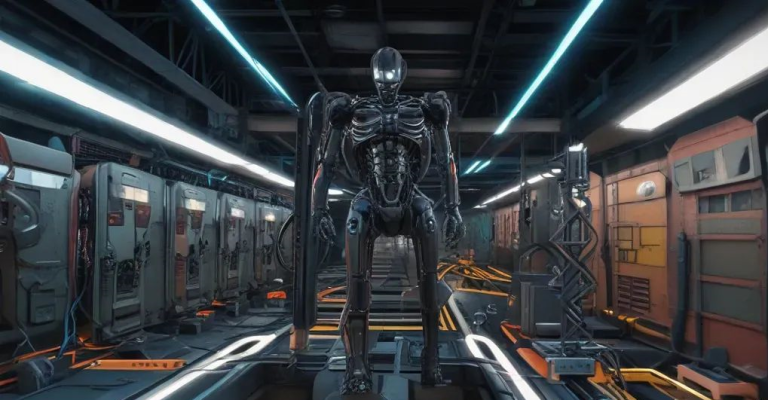
The incorporation of digital technology, automation, and robots is transforming the industrial environment as part of the Fourth Industrial Revolution, often known as Industry 4.0. Superior production efficiency, productivity, and adaptability are becoming the norm as more and more sectors use sophisticated robots. Intelligent automation is causing a global transformation in industrial operations, and this essay delves into the revolutionary effects of robots in Industry 4.0.
ROBOTS IN MANUFACTURING: A HISTORICAL OVERVIEW
Originally used for regulated, repetitive jobs, robotics has been an integral aspect of production for decades. A new age of automation and intelligent robotics has been heralded by technological advances in robotics, such as machine learning, artificial intelligence (AI), and sensor integration. These days’ robots can learn new tasks quickly and accurately, and they can do complicated jobs with ease.
EMERGING PATTERNS IN ROBOTICS ADOPTION:
Personalization and Customization: Manufacturers have sought to meet consumer expectations for personalized products and quicker production periods by implementing adaptable automation technologies. With the use of sophisticated sensors and artificial intelligence algorithms, collaborative robots, or cobots, allow for smooth human-robot collaboration and the quick reconfiguration of assembly lines to meet different product requirements.
Asset Management and Predictive Maintenance: Industry 4.0 robots can track the status of machinery in real-time with the use of Internet of Things (IoT) sensors and data analytics. Manufacturers can maximize asset usage, decrease downtime, and prolong the lifespan of robotic systems by forecasting and mitigating possible faults.
Robotics is an integral part of logistics and supply chain integration, helping to automate and streamline processes across the board, from inventory management and warehouse automation to order fulfillment and delivery. Automated guided vehicles (AGVs) and autonomous mobile robots (AMRs) streamline warehouse operations and cut down on human expenses by efficiently selecting and sorting materials.
Inspection and Quality Control: Computer vision and machine learning are two examples of the robotic technologies that are transforming inspection and quality control in the industrial industry. Robots directed by vision systems can detect flaws, measure measurements, and guarantee product quality with unmatched precision, cutting down on manufacturing mistakes and waste.
EXAMPLES OF ROBOTIC MANUFACTURING IN ACTION:
The automobile industry is making extensive use of robots in a wide range of processes, from welding and painting to assembly and material handling. On assembly lines, collaborative robots help human workers do more in less time without sacrificing safety or quality in the making of vehicles.
Assembly of printed circuit boards (PCBs), soldering of components, and component positioning are all tasks that robots performs well in the electronics manufacturing sector. Robotic arms efficiently and precisely conduct complex soldering and inspection operations, while automated guided vehicles (AGVs) move materials between stations.
Defense and Aerospace: Robots play an essential role in the aerospace industry, helping with tasks like as assembly, drilling, and complicated machining. With the ability to adjust to changes in material characteristics, robotic systems with adaptive machining capabilities may streamline aerospace production processes, cutting down on lead times and enhancing efficiency.
OBSTACLES AND POSSIBILITIES:
Despite the many advantages of robots in Industry 4.0, firms still face a number of problems, such as high initial investment, complicated integration, and the need to reskill their staff. Increased production, quality, and competitiveness are just a few of the long-term advantages of adopting robots that more than justify the upfront cost.
CONCLUSION :
A new definition of production is emerging as a result of the advent of robots in Industry 4.0, which is revolutionizing industrial processes. To thrive in today’s fast-paced, highly competitive industry, manufacturers are realizing the need of intelligent automation to streamline their processes and increase operational agility, flexibility, and efficiency. A new age of smart, connected, and sustainable production is on the horizon, made possible by the endless possibilities presented by ever-improving robotics technology.